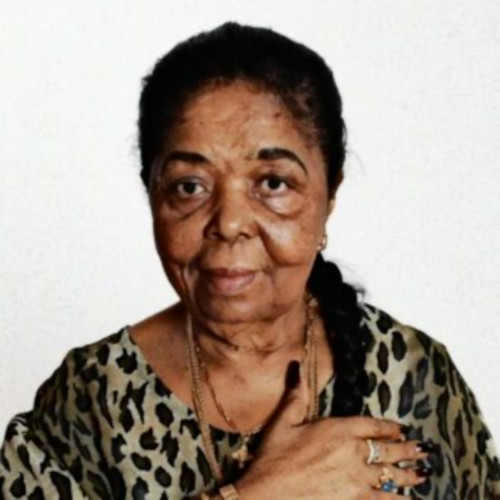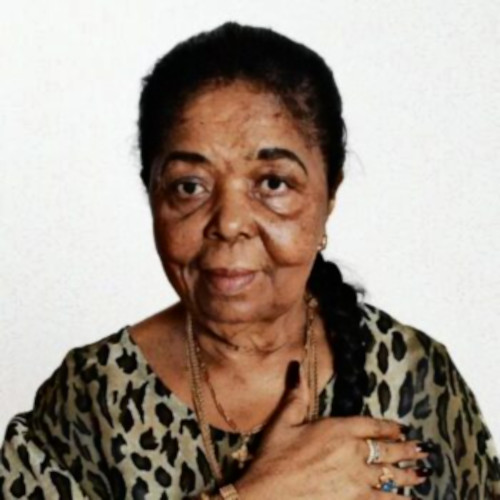


Cesária Évora (1941–2011) was a renowned Cape Verdean singer, often referred to as the "Barefoot Diva" because of her habit of performing without shoes, and the "Queen of Morna," the genre for which she is most famous. Évora's deep, soulful voice and emotive interpretations of morna—a traditional music genre from Cape Verde that blends Portuguese fado, Brazilian modinha, and African rhythms—brought her international acclaim and helped to put Cape Verde on the global musical map.
Birth and Family: Cesária Évora was born on August 27, 1941, in Mindelo, a port city on the island of São Vicente, Cape Verde. She grew up in a poor family and was the daughter of a cook and a musician. After her father died when she was seven years old, Évora and her siblings were raised in an orphanage run by nuns because her mother could no longer care for them.
Early Musical Influence: Évora's introduction to music came early, as she grew up listening to traditional Cape Verdean music. By her early teens, she was singing in local bars and on the radio, encouraged by her uncle, who was a popular guitarist. Despite her talent, she struggled with poverty and alcoholism for much of her early life, performing primarily for local audiences without much hope of international recognition.
First Recordings and Struggles: Cesária Évora made her first recordings in the 1960s, but these early efforts did not bring her significant recognition. Disheartened by the lack of opportunities and the difficult living conditions in Cape Verde, she stopped performing in the 1970s and lived in relative obscurity for many years.
Rediscovery and International Breakthrough: In the 1980s, Cape Verdean musician and producer José da Silva, who was based in Paris, discovered Évora and invited her to record an album in Paris. This led to the release of La Diva Aux Pieds Nus (The Barefoot Diva) in 1988. The album received critical acclaim and marked the beginning of Évora's international career. Her unique style, which combined the melancholic tones of morna with her powerful, yet understated voice, quickly garnered her a dedicated following.
Miss Perfumado (1992): Évora's fourth album, Miss Perfumado, released in 1992, was a turning point in her career. The album included some of her most famous songs, such as "Sodade," "Angola," and "Petit Pays." "Sodade," in particular, became her signature song, expressing the deep longing and nostalgia felt by many Cape Verdeans living in diaspora. The success of Miss Perfumado brought her widespread acclaim, and she began touring extensively around the world.
Grammy Award: Cesária Évora's international recognition continued to grow throughout the 1990s and early 2000s. In 2004, she won the Grammy Award for Best Contemporary World Music Album for her album Voz d'Amor. This win was a significant milestone in her career, confirming her status as one of the leading voices in world music.
Collaborations and Influence: Throughout her career, Évora collaborated with various international artists, including jazz musician Bonnie Raitt, Brazilian singer Caetano Veloso, and Cuban musicians Compay Segundo and Chucho Valdés. Her music has been featured in films and television shows, further expanding her influence and introducing Cape Verdean music to new audiences.
Style and Performance: Évora was known for her distinctive performance style, characterized by her barefoot appearance on stage, which became her trademark. She explained that performing without shoes was a nod to her humble origins and a statement of solidarity with the poor. Her performances were often simple and unadorned, allowing her rich, emotive voice and the beauty of morna to take center stage.
Health Issues and Retirement: In 2008, Cesária Évora suffered a stroke while on tour, which led to a temporary halt in her performances. Although she returned to the stage after her recovery, her health continued to decline, and in 2011, she announced her retirement from music, citing health concerns.
Death: Cesária Évora passed away on December 17, 2011, in Mindelo, Cape Verde, at the age of 70. Her death was widely mourned, both in Cape Verde and internationally, as the world lost one of its most beloved and iconic voices.
Cultural Impact and Legacy: Cesária Évora's impact on the world of music is profound. She brought the music of Cape Verde to a global audience and became a symbol of the rich cultural heritage of the islands. Her interpretation of morna, with its themes of longing, love, and loss, resonated deeply with listeners around the world, transcending language and cultural barriers. Évora's music continues to inspire artists and musicians, and she remains an enduring figure in the world of world music.
Honors and Tributes: In recognition of her contributions to music and culture, Cesária Évora received numerous awards and honors during her lifetime and posthumously. In 2013, the international airport in her hometown of Mindelo was renamed Cesária Évora Airport in her honor. Her legacy is also preserved through the continued popularity of her recordings and the ongoing influence of her work on contemporary world music.
Cesária Évora was a remarkable artist whose music touched the hearts of millions and brought the soulful sounds of Cape Verde to the world stage. Her deep, resonant voice and the poignant, melancholic beauty of her songs made her one of the most celebrated and beloved musicians of her time. Known for her humility, authenticity, and the emotional depth of her performances, Évora's legacy as the "Barefoot Diva" and the "Queen of Morna" continues to inspire and captivate audiences around the globe.

We use cookies
We use cookies and other tracking technologies to improve your browsing experience on our website, to show you personalized content and targeted ads, to analyze our website traffic, and to understand where our visitors are coming from. Privacy Policy.